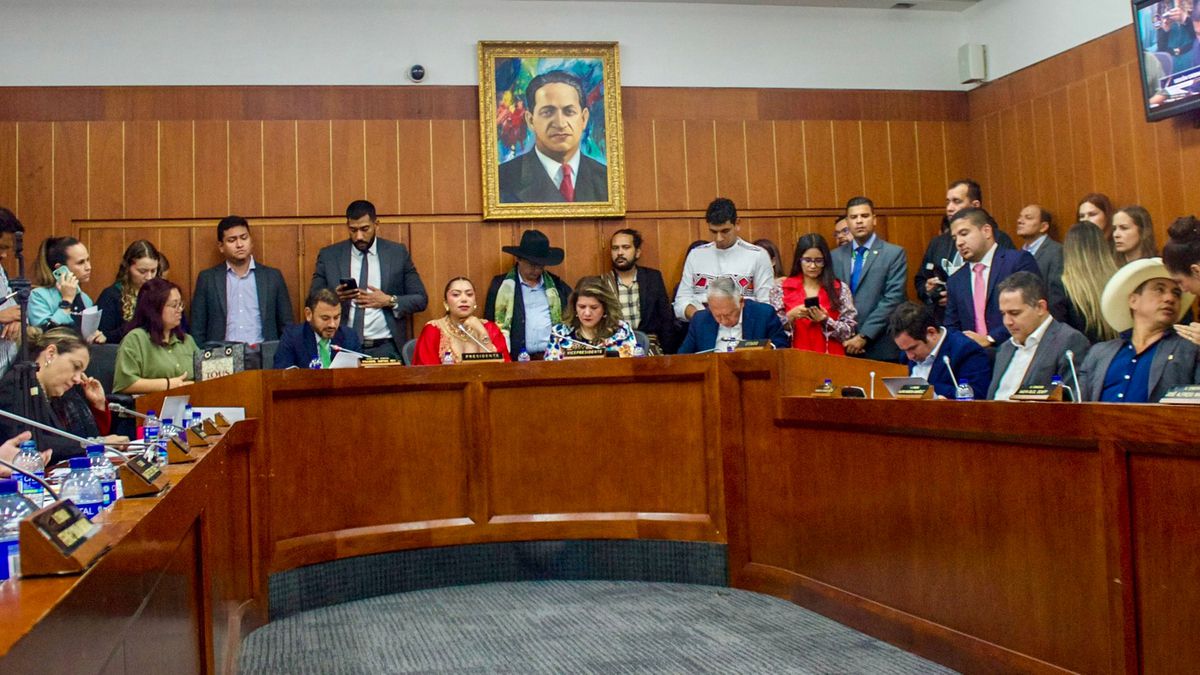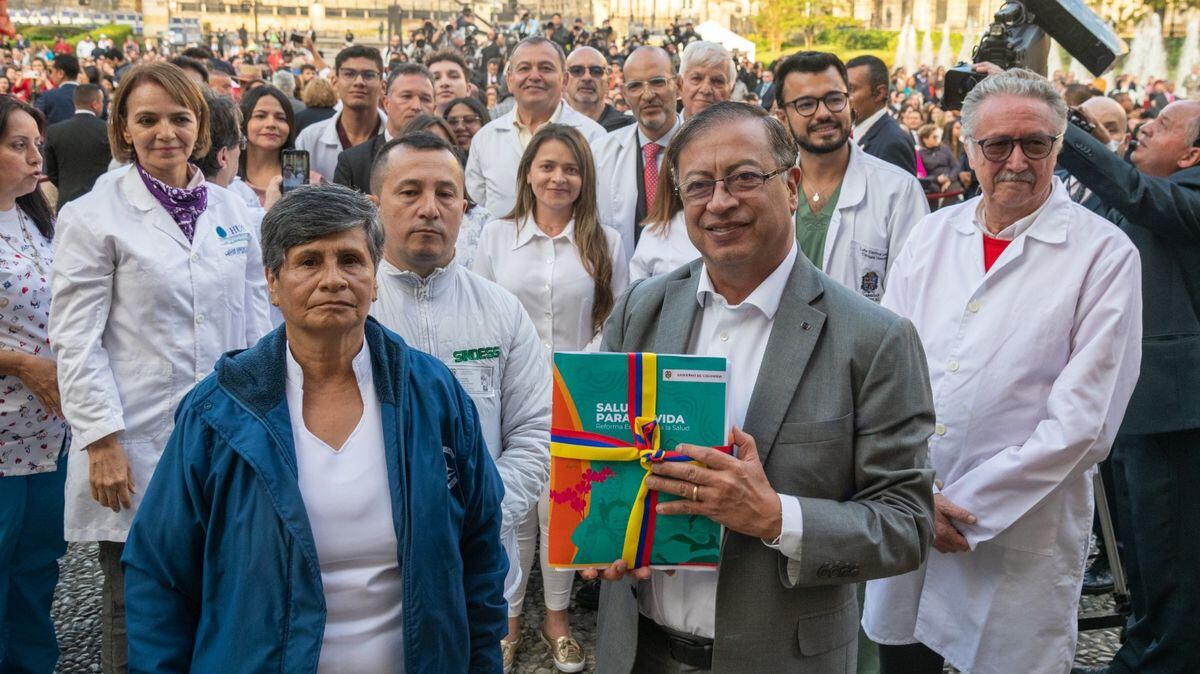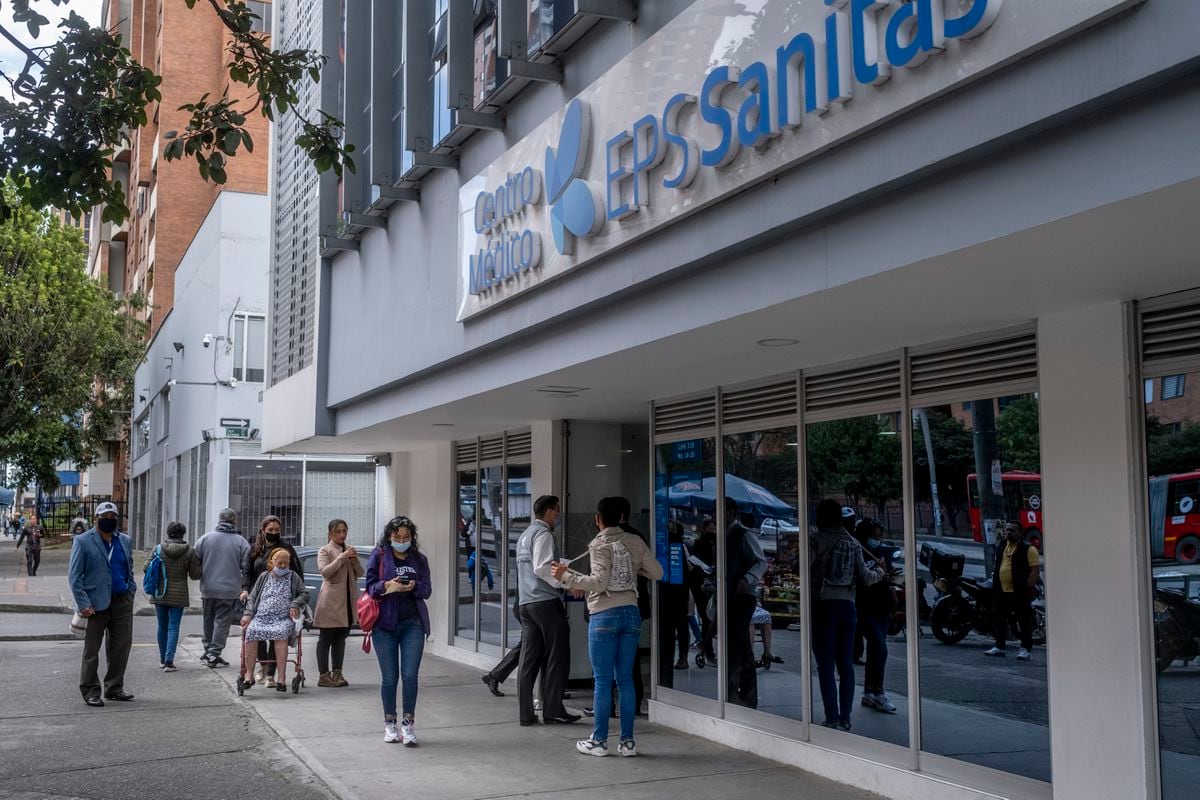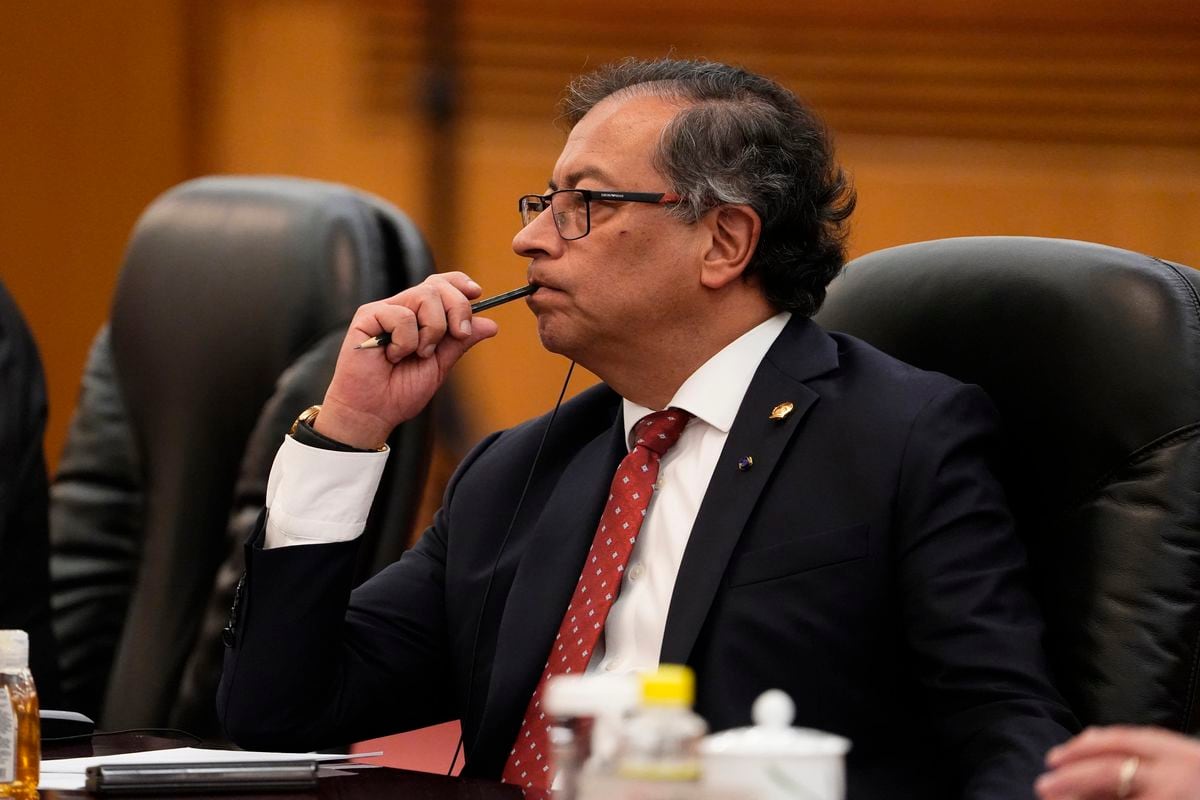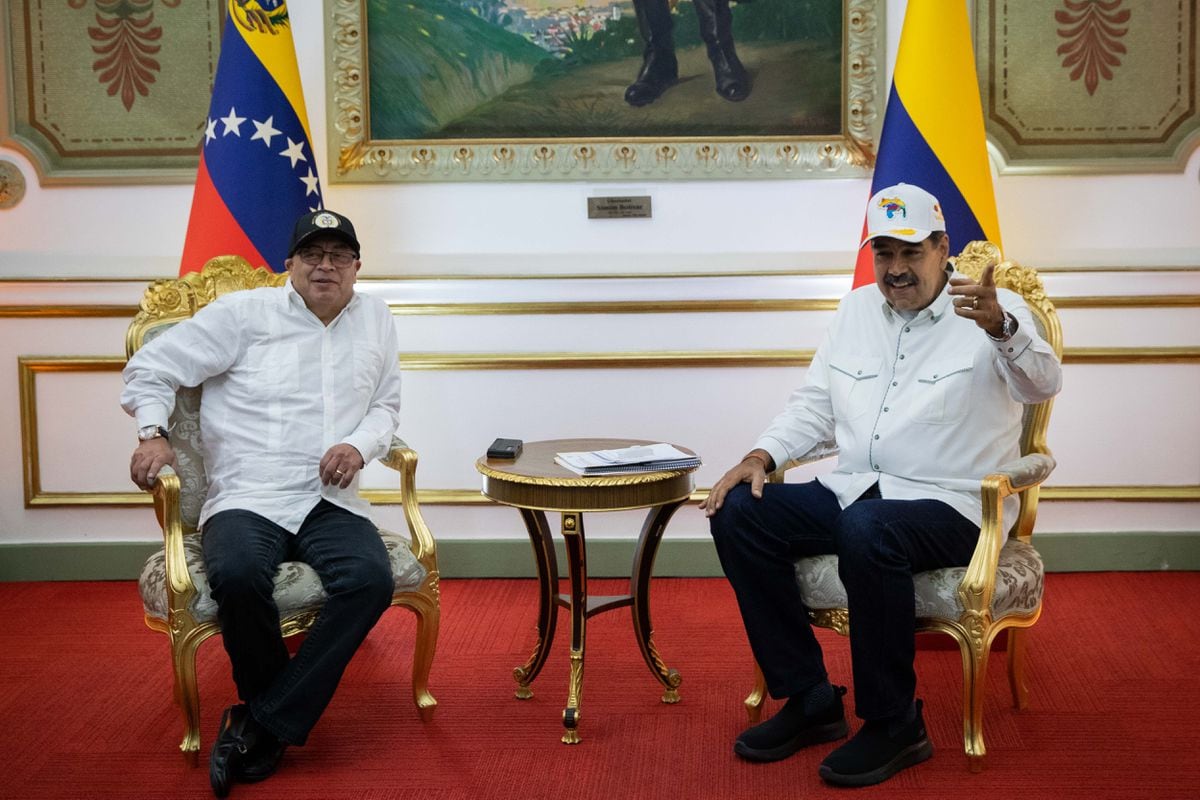Colombia's health minister, Guillermo Alfonso Jaramillo, knows he will have a tough few weeks. The health reform of the government of President Gustavo Petro, which proposes to radically change the system, must successfully pass three debates in Congress to become law. Last week, Jaramillo and his team managed to get the congressmen of the seventh committee of the House to approve the project with large majorities, but they know that the most complex thing is coming. He affirms that he is willing to listen, to dialogue and to yield, but with non-negotiable points. "A red line is that the EPS must be transformed into health managers and must stop being the intermediaries of resources between the State and hospitals," explains the minister in an interview with EL PAÍS.
Jaramillo (Lebanon, Tolima, 72 years old) remembers very well the day he was arriving at his farm and was approached by a peasant asking for help to build a school. "We got a teacher and put electric light on. I was already a medical graduate, but I realized that politics also served to improve people's lives. That's where my career in public life began." He has an extensive career. The son of a liberal congresswoman, he became a councilman in Armero in 1976. He was twice a departmental deputy, reached the House and was in the Senate for four terms. He has twice been governor of Tolima and once mayor of Ibagué. He was secretary of health and government of Bogotá in the mayor's office of Gustavo Petro. He has been the minister of health for a month.
"The EPS do not end, they only transform. The only thing is that they are not going to do financial intermediation. That's it," says Jaramillo as he pets Pink, his 11-year-old collie shepherd dog who accompanies him everywhere. Pink plays with a rubber ball, barks between officials' desks and strolls through the corridors of the 23rd floor of the Ministry building in downtown Bogotá while Jaramillo is in meetings and meetings. The minister acknowledges that in recent years progress has been made in attention, but is emphatic in his criticism of the current system: "Many children in La Guajira are affiliated to an EPS, they have a card, but they still die of parasites because they are not taken care of."
Question. Why does the government of President Gustavo Petro insist so much on health reform?
Answer. In nearly 700 of Colombia's 1,123 municipalities, there are no health centers or hospitals. That's what we want to change. In some areas there have never been and in others they have broken down because the neoliberal model, in which health is a business, does not work in poor and remote regions, it only does so in the upper and middle class neighborhoods of large cities. In addition, the system became a curative and not a preventive one. In the clinics of Bogotá there are robots that operate on you, but the children of La Guajira are dying of hunger, gastroenteritis, parasites. Our health care system is very unequal. That is why it must be changed.
Q. How?
A. With the reform. What we have been doing with the president for a long time is looking for an alternative. We do not want the system to continue to rely on doctors and nurses waiting for patients in hospitals to cure them, but to help prevent disease. And, most importantly: that we manage to serve the most abandoned communities. Today, Pacific women die from poor care after childbirth. That cannot continue to happen. I toured the poor neighborhoods of Bogotá and found that people are affiliated with the EPS, but they do not attend to it. In Colombia almost 93% of people are insured, but the question is whether that guarantees the right to health. We think not. Having a card does not mean having access to the system. After an intense fight in Congress, with the statutory law of 2015 we managed to make health a fundamental right and not a business. That is our struggle and that is the meaning of reform.
Q. Why does the reform propose to take away from the EPS its function of managing health resources to give it to Adres?
A. Today, Adres pays the EPS and they pay the clinics and hospitals. The problem is that many times the State pays the EPS on time, but these do not consign them to the lending institutions when it should be. Why this intermediation? Not at all. We will pay directly. The new law contemplates that at least 80% of the resources must be paid to the hospital in the first month. If we pay them directly and on time, the hospitals will have liquidity and will be able to function and serve people.
Q. That sounds good as an idea, but what logistical, human and technical capacity does Adres have to manage those 80 billion pesos and review hundreds of thousands of invoices?
A. The audit and review of invoices will continue to be done by the EPS, which will become health and life managers. We are going to pay them up to 8 billion pesos to continue fulfilling those functions. The EPS do not end, they are transformed. The only thing is that they are not going to do financial intermediation. That's all. They continue with their affiliates. Patients with chronic and rare diseases will continue with their treatments. The problem is that they have demonized the reform, they have created a lot of fake news. Faced with Adres, it is true that it must be strengthened. Expand your budget and your number of employees so that you can fulfill the functions. We want 2% of the total health money allocated to its operation. The managers will have up to 8% of the resources.
Q. Why do you think there has been so much resistance to reform?
A. The law of gold: he who has the gold imposes the law. If I have the gold, that is, the 100 billion pesos that next year will be allocated to health, I impose the law. But the money does not belong to the EPS, it belongs to all citizens. What we propose is simple: if the money is from the State, an intermediary is not necessary, the EPS will be in other functions. We want to make changes hand in hand with them. We want to dialogue, to build on what has been built.
Q. Speaking of building on what has been built, what good things about the current health system are you interested in preserving?
A. The funding model is important. The state pays half, an interesting achievement that we will maintain. I also recognise that we have made progress compared to the past, but we need to do better, especially in the inclusion of the poorest.
Q. There is a sector of politics and academia that says that one of the main risks of the reform is that the health budget increases a lot, overflows and affects other sectors.
A. There will be more resources for health because we are going to reach territories where we have never arrived. The reform of President Gustavo Petro allows that in less than ten years the budget of the general system of participations, from which part of the money comes, is doubled. However, precautions must be taken. One of the functions of the new managers, for which they will be paid, will be to help us control excessive expenses, to do good auditing so that there is a lot of austerity, but without denying services.
Q. What happens if the EPS does not accept the new rules of the game?
A. I don't think that if they have an 8 billion budget they won't accept. Those who have done their job well can rest easy. Those that don't, have two years to improve, pay off debts, capitalize and catch up.
Q. A major problem of the system, which is not solved by changing the functions of the EPS, is the lack of specialists. How to correct that?
A. Yes, that's true. There are few. We want to work with public and private universities to expand the number of specialists every year. We also want to emphasize the specialty of the family doctor, fundamental for this prevention and primary care project. A family specialist is a person who knows about pediatrics, internal medicine, geriatrics, has a comprehensive vision. We also recognize that specialists, who are concentrated in cities, must be paid very well to go to work in rural areas. The reform provides for such incentives.
Q. You say that there are people who have an EPS card, but that does not guarantee their right to health.
A. If Roy Barreras hadn't been the president of the Senate, he wouldn't have had an executive exam and he wouldn't have been found to have cancer in the early stages. Gustavo Petro had a gastroscopy and found a cancer that had not penetrated the deep layers of the stomach, and eradicated it. Peasants and workers, who have EPS, are never given preventive tests, start having gastritis and are told to take omeprazole.
Q. The health reform has three debates left in Congress, what are you willing to give to reach agreements with the parties and get the necessary votes?
A. All this is malleable, but there are non-negotiable lines. For example, the intermediation of money by Adres. As in Olympic boxing, we still have three rounds to go, and you don't know where you can be knocked out.
Subscribe here to the newsletter of EL PAÍS about Colombia and receive all the informative keys of the current situation of the country.


